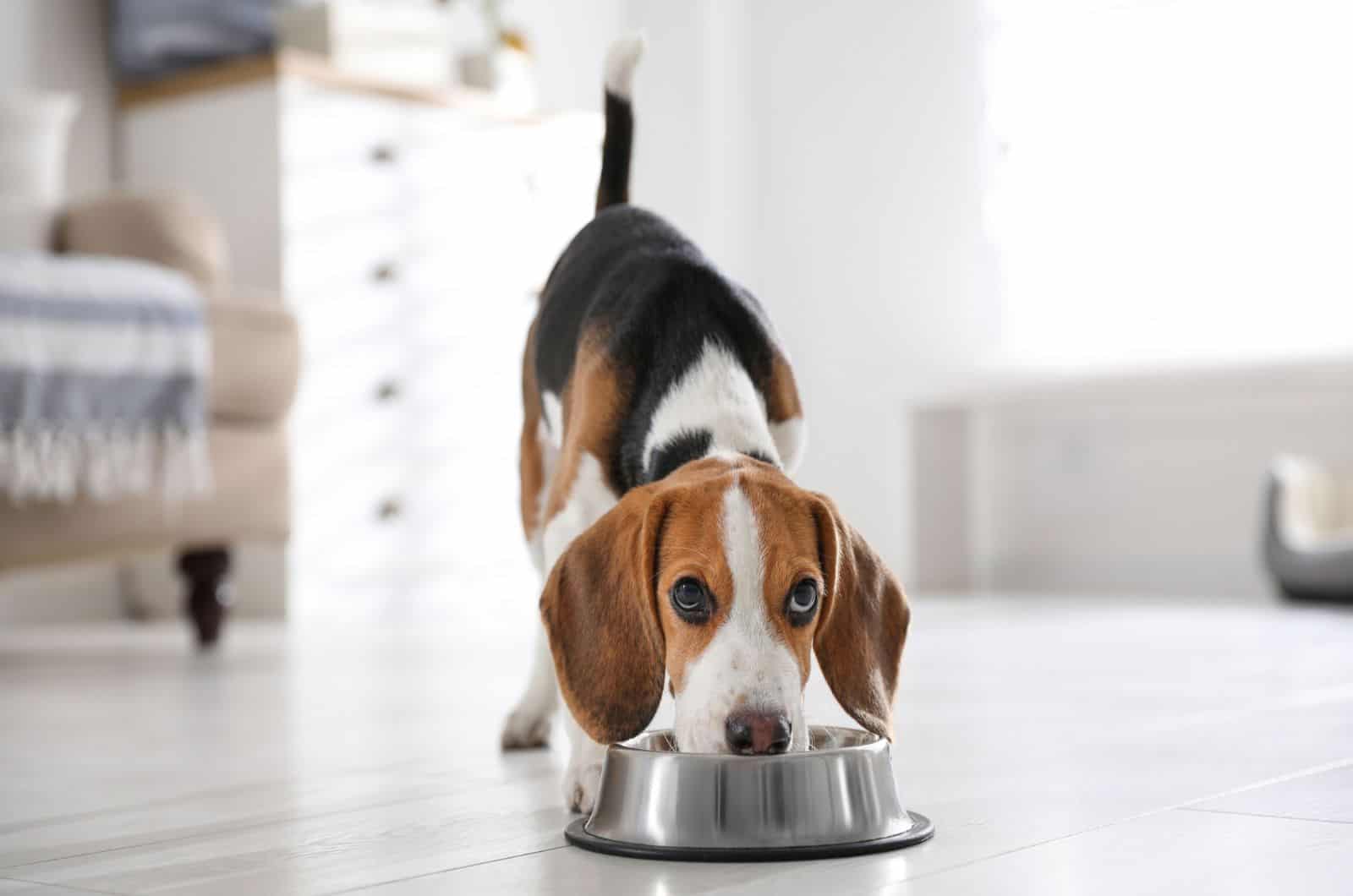Dogs fluctuate with their weight the same as people do.
Even though overweight dogs are more common in today’s society, a lot of dog owners struggle with their dogs being severely underweight.
If you are having an underweight dog and worry about your dog’s health, you are probably in search of the answers; how long does it take for a dog to gain weight?
How can I help my dog gain weight and make him the happiest, healthiest pooch in the world?
In today’s article, we covered all the questions you may have about your dog’s weight and ways you can help them reach their healthy weight.
How Long Does It Take For A Dog To Gain Weight?
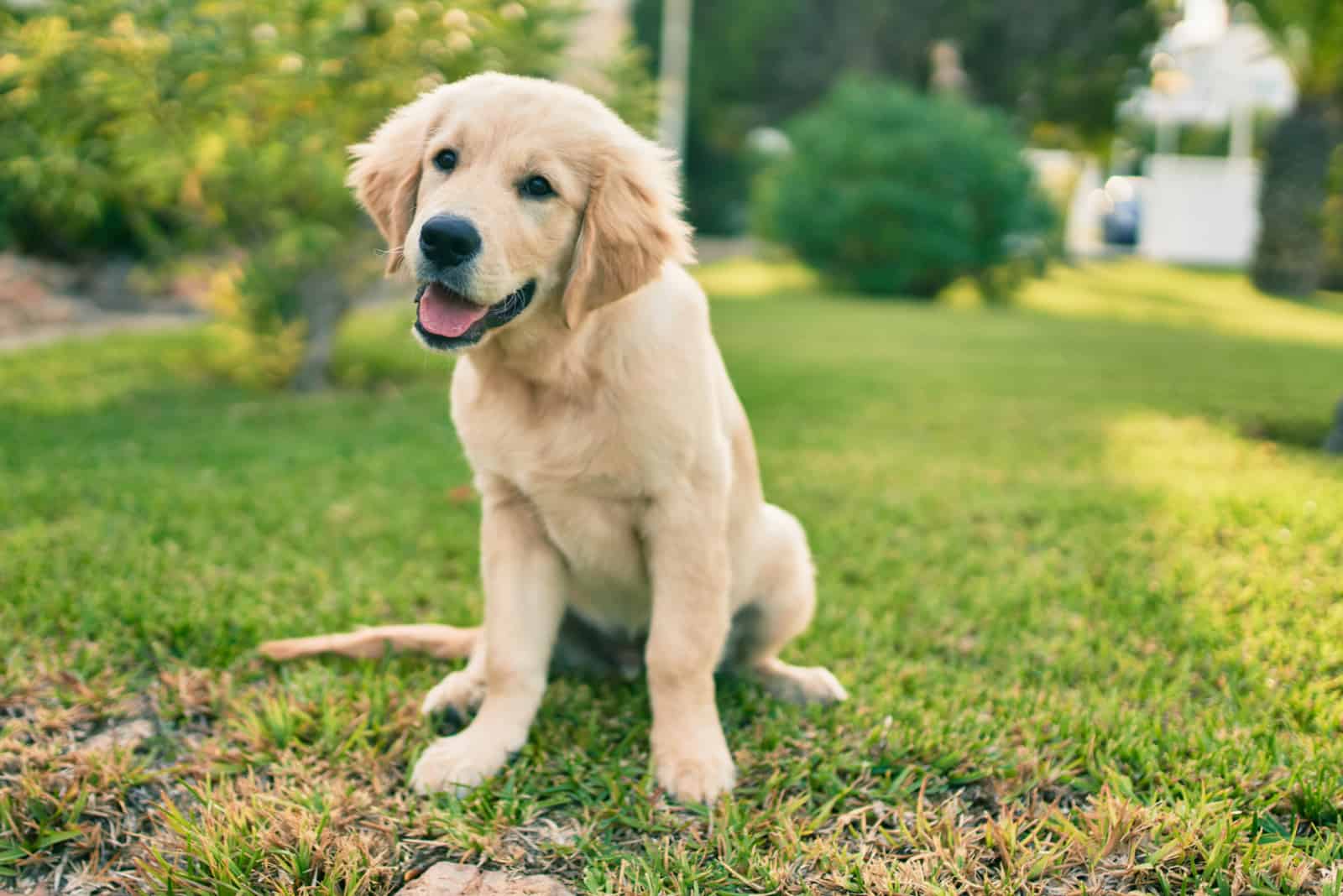
Questions like this are not easy to answer, mainly because there is no universal answer that can give peace to all dog owners out there.
A lot of things need to be taken into consideration – how underweight a dog is, how many pounds they need to gain, and what dog breed they are.
Usually, it takes months for a dog to gain weight, combined with their daily feeding routines and high-quality, high-protein food. Large breeds may take 3 to 4 months to gain 20 pounds, while small dogs need about 3 months to gain 10.
Words ‘don’t worry’ may not help much, but with the right information and a clear plan you can work on any problem your pooch is dealing with.
Keep in mind that all dogs are different. So, how long does it take for a dog to gain weight? Some dogs take longer to gain weight, and some can do it much faster.
Maybe you will be able to see the results very fast, then your dog will stop gaining weight for a while and then continue gaining again.
That doesn’t mean you are doing something wrong or that your dog is untreatable; it just means their bodies are similar to ours.
Dog’s age, stress levels, environment, and amount of food they eat every day play a big part in this process of your dog gaining weight.
How Do You Know If Your Dog Is Underweight?
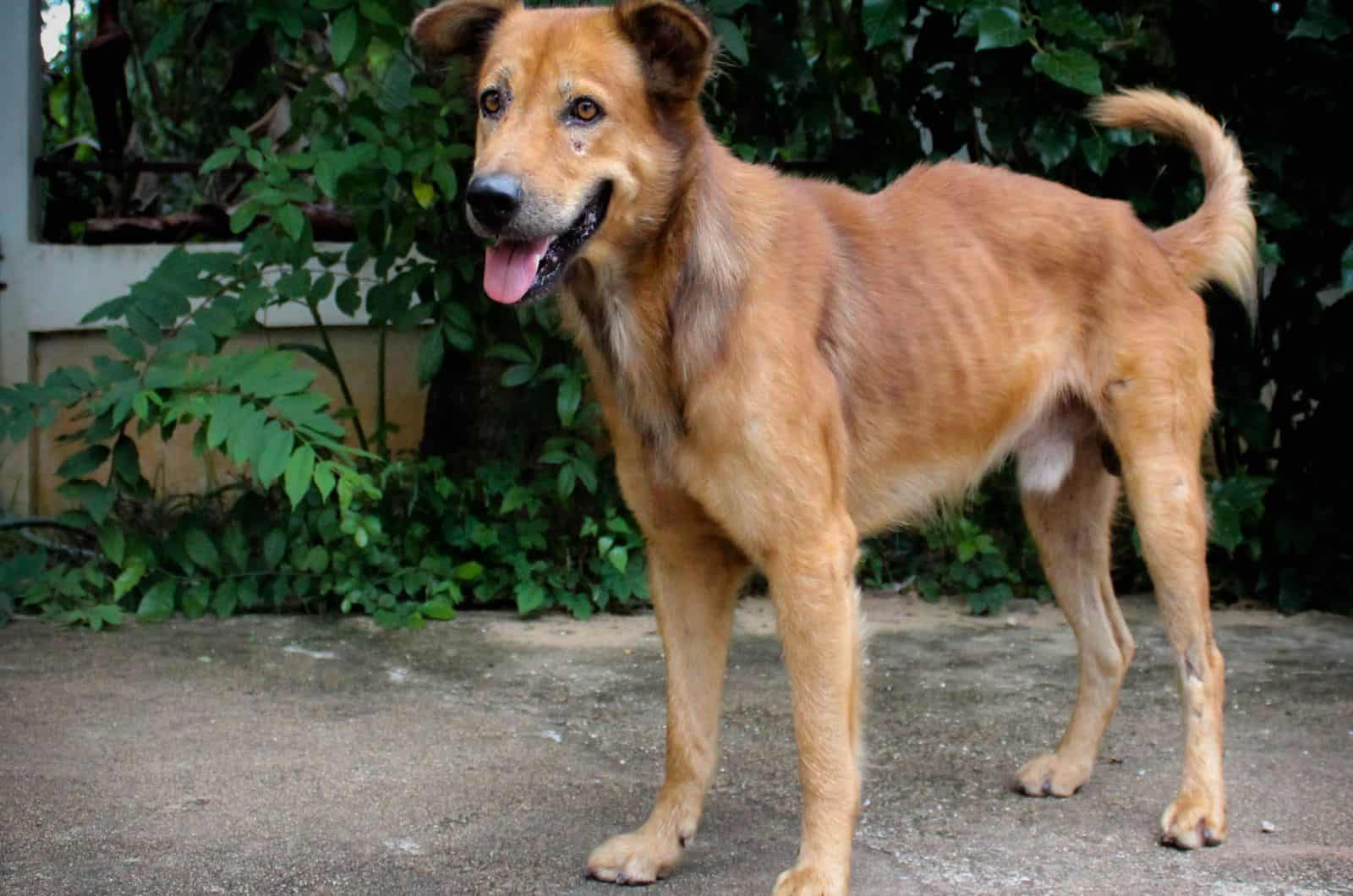
Before we dive into ways we can help our dogs gain weight, we need to answer ourselves, how do we know if our dogs are underweight?
The easiest, most noticeable way is to look at the prominence of his bones. If you can see the spine, ribs, and pelvic bones with no fat on them, it might be a sign your dog is underweight.
But there can be many other signs we should not overlook.
Slow growth and changes in their coats
If you notice dry, dull skin, and hair loss in some areas of the dog’s coat, it can be a sign your dog is underweight.
Dogs have very shiny, thick, and soft fur thanks to the proteins they get through their food, so if there is a lack of protein in their bodies, you will be able to tell by their fluffy fur and skin underneath.
Skin disorders
Skin is the largest organ both in people and dogs, and it is also the best way to see if there are any health issues your dog is dealing with.
Flaky, scaly, and itchy skin can be a symptom of not receiving enough or the right type of food your dog needs. This can cause more problems when dogs scratch their irritated skin which may lead to some skin infections that may be manifested as blisters, foul odor, scrabs, or their skin being hot to touch.
Digestive problems
Digestive problems are usually the best and easiest way to discover your dog has some health issues. If they struggle with diarrhea or maybe have constipation quite often, it is best to visit your local vet and let them examine your dog in more detail.
Weakened immune system
A weakened immune system makes dogs more vulnerable to illnesses. And oftentimes underweight dogs struggle with a lot of health issues because their bodies can’t defend and heal themselves. If your dog is getting sick on a regular basis and you are not sure why; it would be a good idea to check his body weight and body condition overall.
Weakness
There are two types of dogs in this world – couch potatoes and squirrel hunters. Both are fun and interesting in their ways.
Being lazy or overly excited is fine, but if you notice your dog becoming more sluggish and passive – it can be more than just your dog being lazybones.
Lethargy signs can be different depending on the dog’s age, dog’s breed, and level of the dog’s normal energy.
Some examples such as; not being interested in playtime, not wanting to go on a walk, and not participating in their favorite activities could show you that your dog is struggling with their weight.
Why Your Dog Is Not Gaining Any Weight?
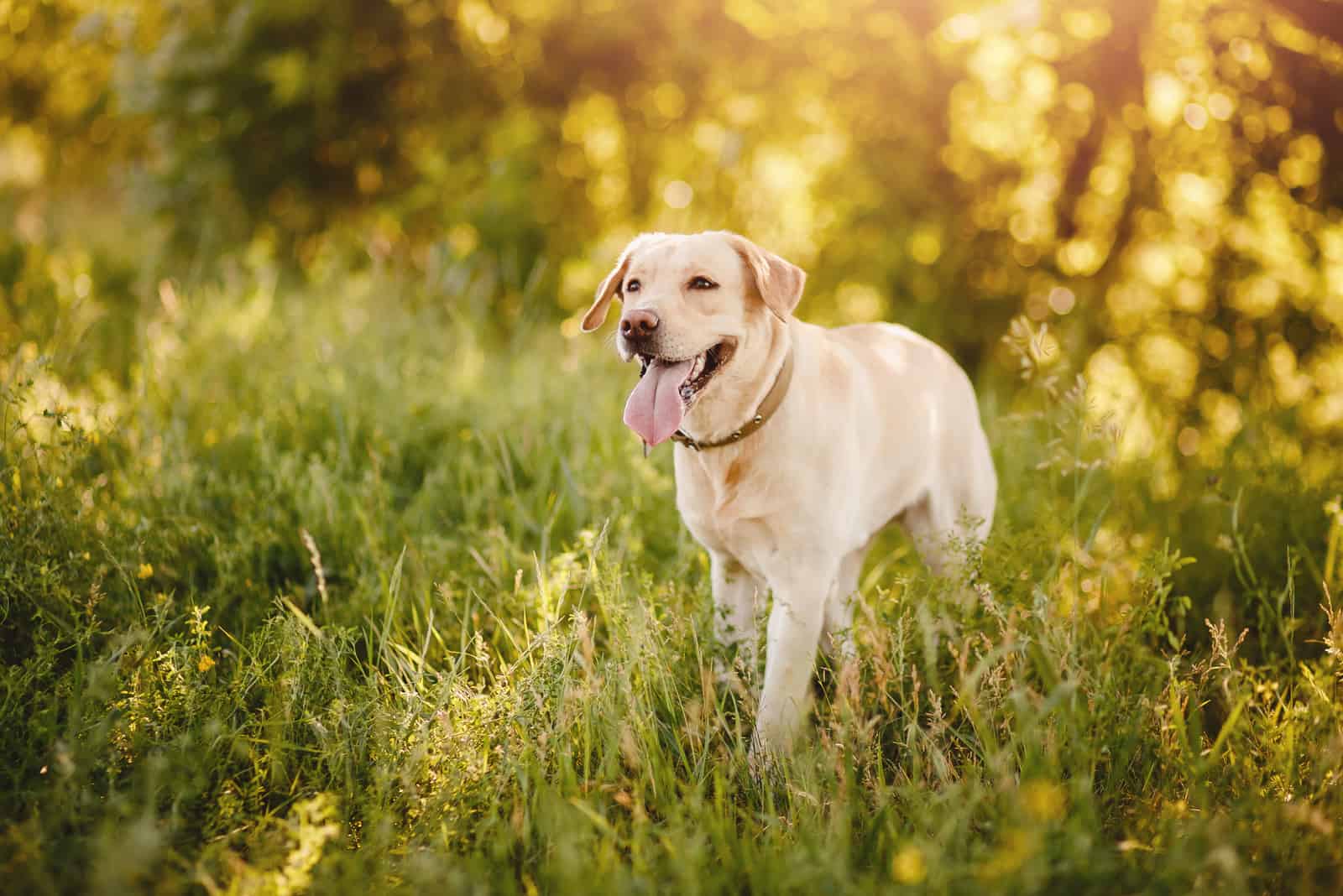
There can be many different reasons why your dog is not gaining any weight.
If you, however, can’t think of the single reason why your dog is eating everything he can find in the house and is still a very skinny dog, the problem can be one of the following:
You are underfeeding your dog as they burn more calories than they take,
Or there are some bigger problems under the surface that don’t allow your dog to gain weight.
If you own a puppy, keep in mind that they need different amounts of food than adult dogs, so you need to adjust puppy food intake properly during the day.
Some other reasons can be:
Age-related
Older dogs struggle to maintain a healthy weight due to oral pain or tooth decay they experience which makes their food hurt to chew. Our senior, best friends, however, are not a lost cause because there are many solutions to their eating problems.
Fresh food, wet food, or specially formulated food for older dogs can make their eating experience much more comfortable and help them reach their ideal weight.
You can also try to soften their food before serving it.
They feel stressed
Dogs, just like people, deal with stress and anxious situations with food. Their coping mechanisms can be eating too much, or not eating at all.
If you have a rescue dog (thank you for adopting not shopping) stress and depression can be one of the reasons they struggle to gain weight, as they probably went through a lot before finding their forever homes.
Sudden schedule changes, too much or too little socialization, becoming suddenly scared of something in the house, and noises can be triggers for weight loss in dogs.
Maybe they are picky eaters
My dog enjoys eating human food like fish sticks and carrots, but dry food for her is a big no, no!
I can’t tell you how many times our expensive kibbles ended up in the neighbor’s dog’s belly because my dog is a picky eater.
If you are dealing with the same problem, I got you!
Try mixing dry food with some dog food toppers (try pumpkin topper and thank me later) or wet food. Not only is the food going to taste better, but will also help you fatten up a dog quicker and easier.
Parasites
Tapeworms, hookworms, and roundworms eat the nutrients needed by a dog since they reside in his digestive system.
If your dog is infested with fleas or ticks, he might become anemic, which can cause him to lose weight. Regular checking, collars, and sprays can help you protect your dog from parasites.
They have some health issues
We want all dogs to be healthy dogs. That’s why it is important to react to every small change you notice in your dog’s behavior.
If your dog has a sudden appetite or weight loss, fever, or vomiting, seeing a vet should be your number one priority. Even some minor symptoms such as excessive farting can be a sign that something’s wrong.
Not all dog weight loss leads to serious illnesses, but it is better to be safe than sorry.
Read More: What To Feed A Sick Dog With No Appetite: We Are Here To Help You
Low-quality food
The quality of dog food plays a huge role in a dog’s weight and well being of a dog’s body.
Food with lots of fillers is usually not recommended because your dog is not receiving any useful nutrients and proteins.
Many human foods are not recommended, either, and can lead to weight loss due to malnutrition or health issues. For example, spicy food can cause more harm than good.
Learning how to read labels and buying dog food in dog food shops is a much better option.
Dogs need to have balanced food full of protein, fiber, fat, water, and a few dog treats here and there.
Also, do your research before buying certain food. There are some brands you should avoid, especially if your pooch has a sensitive tummy.
6 Ways To Help Your Dog Gain Weight
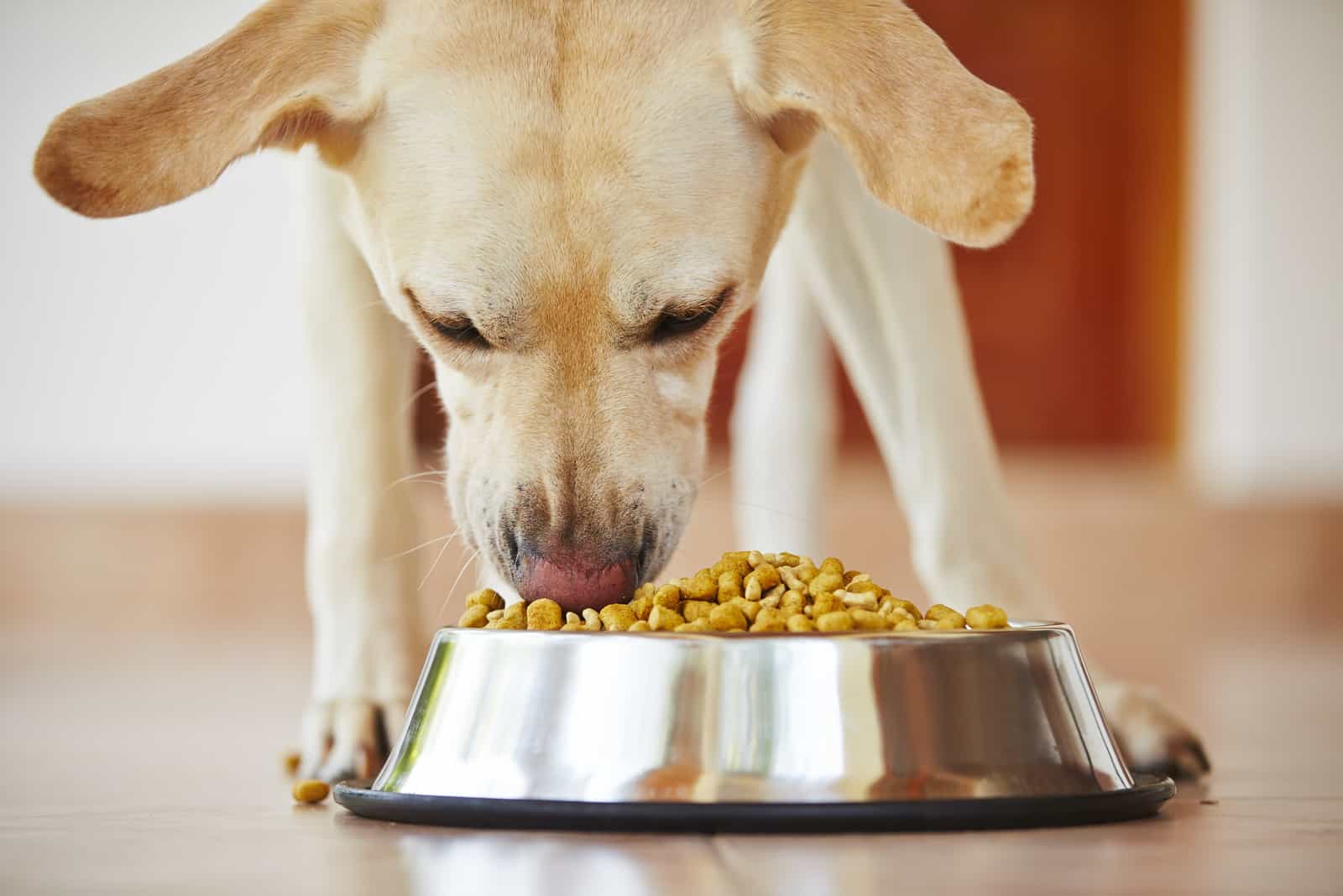
1. Have a feeding schedule
Having a feeding schedule can help both you and your dog.
When you stick to a feeding schedule you can organize your time better and make meals that fit your dog’s diet.
Feeding your dog before he goes to sleep is one very commonly used method to fatten up a dog without making any drastic changes in their and your daily routine.
Eating before bed pushes your body to store the nutrients you receive in food as fat, so this can help your dog gain weight.
But be careful to balance the food intake – give your dog smaller portions of food in the morning, and bigger ones in the evening.
Another, even better method is to feed your dog small meals throughout the day. This way dogs will receive lots of different nutrients and help them have an ideal weight.
You can also try leaving a serving of dry food out in your dog’s bowl, so he can eat when he feels hungry.
It works great if you have dogs with smaller appetites. Pay attention to always leaving dry food as wet food gets spoiled if left out throughout the day.
2. Dog weight gain snacks
I think your furry pooches will appreciate this part the most. Well, who can blame them? I don’t know a single soul who doesn’t like some snacks here and there.
Snacks are a great way to include in your dog’s diet, without adding useless calories or fillers to gain a healthy weight.
Purina has high-quality snacks with high-protein ingredients that taste great and do wonders for your skinny dogs.
Other snacks your dogs would kill for are sweet potatoes, turnips, brussels sprouts, and peanut butter.
Using sweet potatoes, pumpkins, and peanut butter, you are making sure to not add excessive protein to the dog’s diet while helping them to gain weight.
3. High fat and high protein dog food
While high fat and high protein dog food is an important part of helping your dog gain weight, don’t overdo it so you don’t cause stress on the dog’s pancreas and digestive problems.
A good way to do this is to boil chicken for dogs.
Pumping your dog with calories he will not use will create fat but will not help him build muscles.
Try to balance high-calorie food and daily exercise so the dog’s body can use those calories to build muscles instead of just fat.
You can combine old food and new food your dog didn’t consume before so he doesn’t get an upset stomach.
Try mixing 90% old food and 10% new food, and continue increasing fresh food until you make a complete switch.
High carbohydrate foods like brown rice and sweet potato can help your dog gain weight.
Eggs are also a great food to include as they are high in protein, vitamins, and fatty acids. Fatty acids help support your dog’s body inside and out.
4. Wet food and fresh produce
Wet food and fresh produce are great to use when your dog dislikes kibbles. Wet food and fresh produce usually have a stronger scent, and they can be more appealing to dogs.
Many people also try giving their pups raw dog food, but you need to know the right amount for the puppy and the adult dog.
5. Daily exercise
Dogs need activity during the day, no matter if they are overweight dogs or not.
Exercise helps dogs turn those carbs they get from food into energy.
Just pay attention to not walking or engaging your dog in any kind of activities right after eating because that can make their stomachs upset. Wait at least half an hour before going to explore.
6. Consult the vet
Don’t forget to do your regular check-ins with a vet. They can help you make a healthy plan and give you some advice on how to help your dog gain weight and how to maintain it.
To Wrap It Up
Trying to fatten up a dog is not an easy task, but with the right guidance and clear plan, it is possible.
How long does it take for a dog to gain weight is hard to tell, but combining new and healthy habits can lead you to success.
Adding small meals, high-quality, high-protein food, and regular activities can help your dog reach a healthy weight and have a long, fulfilled fur-tastic life!
